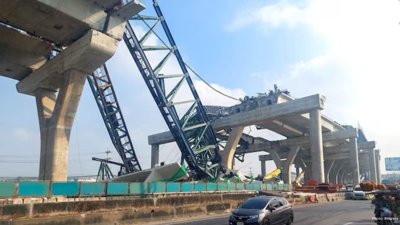
Post by : Meena Rani
Via Transportation, a well-known transit technology company, entered the stock market this week with its debut on the New York Stock Exchange (NYSE). The company was valued at $3.5 billion, but its first day on the exchange was not as strong as expected. Shares fell 4.4%, opening at $44 per share, which was below the offer price of $46.
Despite the early drop, Via and its selling shareholders successfully raised $493 million by selling 10.7 million shares. This shows there is still significant interest in the company’s future, especially as global demand for better public transport solutions continues to grow.
This debut comes at a time when the U.S. IPO (Initial Public Offering) market is slowly reviving. Recent months have shown more activity, with easing trade tensions and growing hopes that interest-rate cuts will make investors more willing to take risks.
This week, in particular, has been called the busiest week for IPOs since 2021, with several new companies stepping into the market. Via is one of the standout names because it works in the transportation technology space—a sector seen as crucial for the future of cities.
Unlike companies such as Uber or Lyft, which mainly focus on ride-hailing, Via does not operate independently. Instead, it partners with public transit networks, cities, schools, and agencies. Its goal is to improve existing public transport systems rather than replace them.
Via provides:
Software solutions for scheduling and intelligent routing.
Operational services that help cities and institutions manage transportation.
On-demand ride-sharing tools that blend private convenience with public infrastructure.
By working directly with governments and agencies, Via positions itself as a partner in modernizing public transport, which is becoming more important as cities face congestion, climate challenges, and population growth.
Even though Via has been growing and expanding its business, it remains unprofitable. For the three months ending on June 30, the company reported:
Revenue: $107.1 million
Net Loss: $21.2 million
These numbers highlight a common challenge for many tech-focused companies: strong growth does not always mean profit. For Via, its reliance on public contracts, regulatory approvals, and slower scaling across jurisdictions adds complexity to its business model.
Industry experts point out that Via’s model is unique but also carries risks. According to analysts:
The company faces lower margins compared to other tech firms.
It may grow slower across cities because every region has different rules and budgets.
It depends heavily on public-sector funding and cooperation.
This makes Via less flexible than other tech firms that can grow rapidly in private markets. Still, its focus on sustainability and public needs could prove to be a long-term strength.
One of the biggest factors driving demand for companies like Via is the changing needs of cities. With rising populations, traffic congestion, and environmental concerns, governments are under pressure to improve transport.
Some of the major issues where Via’s technology could help include:
Climate change: Reducing car dependency and emissions.
Urban congestion: Offering smarter routes and fewer delays.
Equity in transit: Ensuring affordable access to transportation for all communities.
As more countries push toward green mobility and smarter cities, firms like Via may see bigger opportunities despite current losses.
So far, 2025 has seen a mixed response to technology IPOs. Companies linked to AI (Artificial Intelligence) and FinTech (Financial Technology) have performed the strongest. Other tech firms, however, have shown uncertain results, with some enjoying a strong start and others facing early drops.
Analysts suggest that Via falls into the category of important but challenging tech companies. Its sector is vital for the future, but success will depend on how well it manages government partnerships and continues expanding worldwide.
Market experts noted that:
Investors are curious about the long-term value of Via because it plays in a different space than Uber or Lyft.
The company’s focus on partnerships with cities could protect it from some of the risks that private ride-hailing apps face.
However, its exposure to regulations and government budgets will keep profit growth slower than in other tech sectors.
Via’s NYSE debut is just the start of its public journey. The company’s leadership has stressed that it sees its role as supporting global transit systems, especially as the world deals with climate change and urban pressure.
If it can turn partnerships into consistent profits, it could become a key player in shaping the future of transport. But for now, investors will be closely watching whether Via can reduce its losses while still expanding across new cities and countries.
Via Transportation entered the stock market with a valuation of $3.5 billion, but its shares slipped on the first day. While the IPO raised nearly $500 million, the company remains unprofitable and faces challenges with scaling and government dependencies.
Still, with global cities demanding smarter, greener, and more efficient public transit, Via’s unique model could prove essential for the future. Its NYSE debut marks a significant step, but the real test will be how well the company balances growth with profit in the coming years.
#viatransportation #ipo #stockmarket #publictransit #technology #nyse #businessnews #urbanmobility #transportationtech #globalmarkets










Advances in Aerospace Technology and Commercial Aviation Recovery
Insights into breakthrough aerospace technologies and commercial aviation’s recovery amid 2025 chall

Defense Modernization and Strategic Spending Trends
Explore key trends in global defense modernization and strategic military spending shaping 2025 secu

Tens of Thousands Protest in Serbia on Anniversary of Deadly Roof Collapse
Tens of thousands in Novi Sad mark a year since a deadly station roof collapse that killed 16, prote

Canada PM Carney Apologizes to Trump Over Controversial Reagan Anti-Tariff Ad
Canadian PM Mark Carney apologized to President Trump over an Ontario anti-tariff ad quoting Reagan,

The ad that stirred a hornets nest, and made Canadian PM Carney say sorry to Trump
Canadian PM Mark Carney apologizes to US President Trump after a tariff-related ad causes diplomatic

Bengaluru-Mumbai Superfast Train Approved After 30-Year Wait
Railways approves new superfast train connecting Bengaluru and Mumbai, ending a 30-year demand, easi